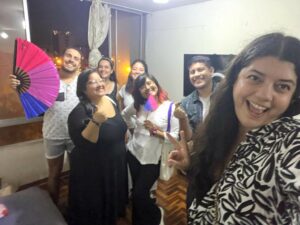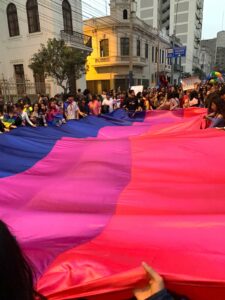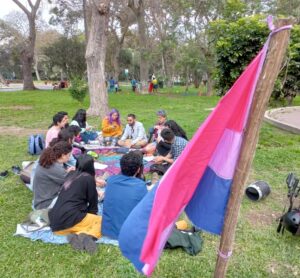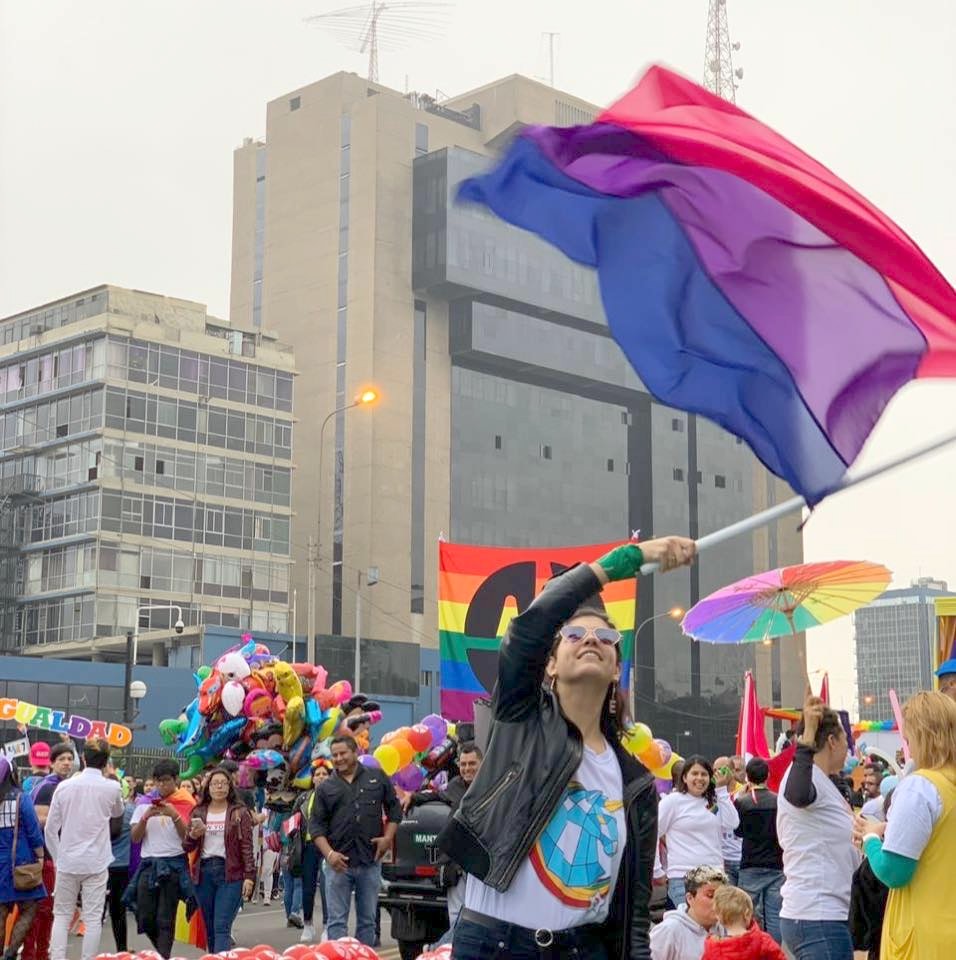Bisexual, binational, bicultural, and bilingual. These words encapsulate key parts of my identity.
I was born in New York, United States to Peruvian parents and grew up in Lima, Peru, attending an American school. My upbringing was a mix of Peruvian family values, American media, and an American education. When I was a teenager, I realized I was bisexual, but I did not live openly until I was in my early twenties. I have always felt like I was “in between” identities and this has generated a lot of internal turmoil and anxiety. Now, I understand the beauty of not being one or the other, and especially of living in the purple stripe of our beautiful bi flag.
I am proud to be Peruvian, even though with regard to LGBTQI+ rights, Peru falls far behind its neighbors in terms of its lack of comprehensive legislation that recognizes human rights such as marriage equality, trans rights, protection against hate crimes, etc. It has been incredibly difficult to make a lasting change in public policy because of the stern grip of the Catholic Church on Peruvian society and the ongoing political crisis in all branches of government.

Pamela, right, with members of Orgullo Bi Peru
Specifically, being bisexual in Lima, Peru means that you are constantly getting erroneously grouped into identities based on the gender of your partner. It means that you do not exist, that you are seen as the most privileged of the LGBTQI+ community, and that your fight is not considered important enough to be mentioned. But this is changing.
Over the last five years, I have witnessed how bisexual folks in Peru have been working arduously to build community and fight against bi erasure. One example of this change is Orgullo Bi Perú, the first bisexual collective in the country, which I co-founded with fellow bisexual activists who I admire deeply. It all started in a WhatsApp group chat that was created during Pride 2019, and it became an online safe space for bisexual people.
As the group grew and we were put into a strict lockdown due to the COVID pandemic, the chat became a necessary community space for many of us, where we would organize virtual meetups to discuss relevant topics. Our online conversations became a collective catharsis of the biphobia we have faced in our families, schools, workplaces, friend groups, etc. It also was a space where bisexuals and questioning folks could feel validated by their peers. Eventually, a smaller group of activists who were willing and able to do more decided to start organizing. We created the collective now known as Orgullo Bi Perú.

10 meter bisexual flag at Lima Pride 2023 for the 2nd consecutive year
As an organized group of bisexual activists, one of our key objectives is to foster community online and offline. This led to us organizing in-person “bicnics” (bi picnics) once it was safe to do so. We have hosted and co-organized 11 bicnics in four cities in Peru, mainly in Lima. We always see both familiar and new faces. Each bicnic is unique because of the people who attend and the topics we cover. On some occasions, we have even organized educational games about bi history and culture. As a member of Orgullo Bi, I am most proud of our in-person “bicnics” that have fostered a community bond, the online panels we have organized every Bi Visibility Day since 2020, and the 10-meter bi flag we crowdfunded for to make our presence known during the Pride March in Lima in 2022 and 2023. On a personal note, I am grateful to have a space in which I feel that I truly belong and am able to fight for my community.
Furthermore, while Orgullo Bi was being born, I launched an Instagram blog called “Soy Bisexual” (“I Am Bisexual”), a personal project I had been brewing for quite a while. After many years working in communications for feminist and queer collectives and organizations, I wanted to have a space where I could use my own personal voice and create educational content on my own terms. The objective of the blog is to create educational content and platform diverse bisexual people, all in Spanish. The language of the blog was very important to me, as a fluent Spanglish speaker, because I noticed a lack of information about bisexuality in Spanish. What I am most proud of is having reached one million people with a post that said “Recordatorio bisexual: Salir del clóset como bisexual no es ‘más fácil’” (“Bi reminder: Coming out as bisexual is not ‘easier’”). I have received many messages from people telling me that the blog’s content has helped them come to terms with their own bisexuality or helped them understand a family member coming out as bisexual. My blog has reinforced my belief in the power of bisexual visibility and the importance of creating community.
Due to a variety of reasons, including the political instability created by the revolving door of Presidents, the death of 50 people during the protests of November and December of 2022, and many other consequences of the ongoing corruption in our country, bisexual activism in Peru has become slightly stagnant.
There is a lot happening around the world, but I truly believe that hope is the fuel we need to change things for the better. To create lasting change, we must continue to work on our community spaces, engage in political advocacy, and educate our potential/future allies.

A bicnic organized by Orgullo Bi
Featured image: Pamela at Lima Pride 2019

